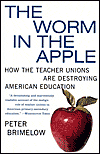|
BEWARE OF THE "CONCERNED" PARENTS GROUP... THEY DO THE DIRTY WORK OF THE UNION! They prey on the emotions of the real
concerned parents and exist only to further the greedy agenda of the teachers union. The teachers union is the root cause
of the problems with education in our communities.
Note: Before anyone starts with the teacher bashing cry, our issues are with the deceptive practices of the teachers union, not the teachers per se!
Books
about Teachers Union Shenanigans:


Forbes.com
Imperfect Union
Neil Weinberg
04.05.07, 6:00 AM ET
Lies, kickbacks, union corruption and tens of millions of dollars in ill-gotten gains
are among the accusations laid out in a lawsuit that's likely to strike fear in the hearts of labor leaders and financial
executives across the country.
The suit, which is seeking class action status, accuses ING Life Insurance and the
New York State United Teachers of ripping off union members in a retirement savings plan through over-charges, undisclosed
payments and kickbacks.
The action is unusual in seeking to make the defendants subject to the Employee Retirement
Income Security Act. Until now, union pension plans have largely been exempt from ERISA, which was enacted to protect workers
in private-sector pension plans. If the suit is successful, ERISA claims could emerge as a huge potential liability for organized
labor and Wall Street alike.
Lynn Sarko, an attorney with Keller Rohrback in Seattle, who represents the plaintiffs,
says he's preparing to file three similar suits in the next month.
"Our investigation shows this was not an aberrant
practice but widespread at ING and its competitors," Sarko says. "What's so insidious in the New York case is that union
officials held themselves out as having investigated and approved retirement products when they were in fact conspiring with
ING to hide the facts and personally benefit."
ING is reviewing the suit and declined comment through a spokesman.
NY State United Teachers said through a spokesman that it was not surprised by the suit and its benefits arm will "provide
an appropriate legal response."
The suit, filed in United States District Court for the Southern District of New
York, claims that, unbeknown to its members, the union accepted millions of dollars from ING in exchange for an exclusive
endorsement of an allegedly over-priced deferred annuity. The ING product was offered inside a retirement savings plan known
as a 403(b), which is similar to 401(k) plans offered in the private sector.
The arrangement was first uncovered
in a Forbes story, "Costly Lesson," in April 2005. The story prompted a lawsuit by then-New York state Attorney General Eliot
Spitzer. ING paid $30 million to settle the suit and the teachers' union paid $100,000. The settlement did not preclude any
further litigation based on the ERISA claims.
Historically, unions and public entities offering 403(b) plans have been
exempt from the stringent fiduciary duties imposed by ERISA because they did not actively manage them. However, the NY
State United Teachers members' suit argues that, because the union exclusively endorsed ING's product, received millions of
dollars in compensation and actively promoted it, both the union and ING are subject to ERISA.
The suit claims
"ING reimbursed NYSUT for the salaries of certain employees of NYSUT whose jobs were to promote the plan to members while
appearing to be disinterested NYSUT employees."
The union received as much as $3 million annually for its
endorsement and told its members "we've done all the background work so you don't have to!" In total, 53,000 union members
invested over $2 billion in the plan. Expenses ran several times those of lower-cost alternatives.
Teacher Union Brass Accused of Taking
Kickbacks
Lawsuit Filed by New York State Teachers Could
Be First of Many
In a class-action suit filed in March,
New York teachers
are charging that the
top officers of the benefit arm of the New
York State United Teachers (NYSUT)
union illegally
accepted millions of
dollars from an investment firm in
exchange for exclusively promoting to
teachers an annuity
offered by the firm.
The lawsuit, filed in a federal court in
Manhattan, is "likely to strike fear in the
hearts"
of union officials and the
financial executives with whom they do
union business "across the country,"
according
to Forbes magazine Senior
Editor Neil Weinberg.
As Mr. Weinberg puts it, the suit
accuses the NYSUT hierarchy
and the
investment firm, ING Life Insurance, of
"ripping off union members in a retirement
savings
plan through over-charges,
undisclosed payments and kickbacks."
And Lynn Sarko, an attorney with the
Seattle-based
law firm Keller Rohrback,
who represents the plaintiffs, told Mr.
Weinberg "he's preparing to file three
similar
suits" this spring.
These lawsuits could be just the tip of
the iceberg.
On April 7, Keller Rohrback issued
a
press release announcing it has begun
investigating a deal between the bosses of
the National Education Association
(NEA)
teacher union and the insurance firm
Security Benefit.
Keller Rohrback is seeking to
determine whether
the NEA union brass
have improperly endorsed an annuity plan
offered by Secuity Benefit in exchange for
payments
the union receives from the firm.
Interests of Teachers,
Teacher Union Bosses May
Be Sharply
at Odds
"Until their arrangement was exposed,
ING Life Insurance handed up to $3
million annually
to NYSUT officials,"
noted Cathy Jones, director of Concerned
Educators Against Forced Unionism, the
education arm
of the national Right to
Work movement.
"The payments constituted
reimbursement for the salaries of
NYSUT
employees whose jobs were to
promote the apparently over-priced
annuity plan to teachers while pretending
to be disinterested
union staffers.
"Union lawyers may claim this
arrangement was not technically illegal.
But even if that's true,
the facts in the
NYSUT lawsuit clearly show the
interests of teachers may be sharply at
odds with those of teacher
union bosses.
"And this scandal helps illustrate why
state laws granting union bosses
monopoly power to
negotiate with school
boards over the pay, benefits, and
working conditions of teachers, including
union members
and nonmembers alike,
have proven so harmful."
Committee Fights to Roll
Back
Teacher Union Monopoly
Bargaining Across Country
Ms. Jones explained: "It's bad
public
policy to hand any group monopoly
power to speak for a teacher who would
rather speak for himself or herself.
"This
is true even if the group has a
record of moral probity.
"The fact is, though, as teachers' suit
against the
NYSUT and imminent
litigation and ongoing investigations by
staff attorneys for Keller Rohrback show,
it's
very common for teacher union
officials to pursue their self-interest at
teachers' expense."
"The
law should not facilitate such
corruption," commented National Right
to Work Committe President Mark Mix.
"That's
why the Committee and our
2.2 million members are working
nationwide to roll back union monopoly
bargaining over
public-school teachers
and other employees.
"For example, just this spring the
Committee and its allies in
Utah
successfully lobbied for enactment of a
law that significantly curtails teacher
union officials' monopoly-bargaining
privileges.
"The
new law requires school districts
and charter schools to give equal access
to all education employee organizations,
including
nonunion professional groups
that oppose monopoly bargaining as well
as teacher unions.
"Under the new law, no
teacher union
can monopolize teacher mailboxes or email
or employee orientation sessions, or
receive favorable treatment
or
endorsements from a school system.
"Greedy and power-hungry teacher
union officials
have time and again
victimized not just teachers and other
school employees, but also schoolchildren,
parents and
taxpayers.
"But I'm cautiously hopeful that, over
the next few years, many other states will
emulate
Utah by rolling back or
altogether prohibiting teacher union
monopoly bargaining.
National Right to Work Newsletter
– May 2007
CREDIT: GOTHAM GAZETTE
Excerpt from Newsday
Analysis: NY's special interests well-fed by your tax dollars
By MICHAEL GORMLEY
Associated
Press Writer
April 12, 2008
ALBANY, N.Y.
The Legislature
took a lot of heat last week for its secret budget negotiations, its abandonment of public conference committees required
by its own 2007 reform law, and its refusal _ with Gov. David Paterson _ to release details of how they would spend New Yorkers'
money until the bills were already passed.
But it
wasn't a complete secret. The unions and other special interests that have poured $171.2 million into lobbying over the last
year and gave candidates millions more for campaigns were in on it.
In the
hectic final days before New York's $121.7 billion budget
was adopted Wednesday, lawmakers debated bills for hours in televised sessions. But most of the decisions had already been
made behind closed doors, sometimes with lobbyists at the table. The public, who pays for it all, was shut out.
Take Verizon
Communications, a major employer in New York. The company
spent $3.2 million to lobby lawmakers and tossed another $157,620 at their campaigns, according to a report released last
week by the state Public Integrity Commission.
One of
Verizon's interests in Albany is a cell phone bill of rights
measure that would bar companies from requiring a customer to renew his or her service plan when adding a new phone, and prevent
a company from making the period of a contract longer. The industry is fighting this consumer-friendly bill, which remains
stuck in committee.
Sometimes
the money is not spent to block, but to get.
The New York State
United Teachers and United Federation of Teachers unions spent almost $3 million lobbying in 2007, the year the report examined,
and contributed $841,703 to campaigns. On Wednesday, the Legislature provided a record $1.75 billion increase in state school
aid despite a gaping deficit and falling revenues. In addition, the powerful unions secured a legislative change among thousands
of pages of budget bills that prohibits school districts from using student performance on test scores as a basis for denying
teachers tenure.
And most of the gush of education cash will go to salaries and hiring more teachers and administrators, said
E.J. McMahon of the Empire Center for New York State Policy,
part of the fiscally conservative Manhattan Institute. Adding more teachers and staff is often masked by saying the money
will pay to reduce class sizes, a more popular notion for the public.
"It feeds the bottom line and increases the union argument for paying them more," he said.
The result of taxpayers providing a big increase in state aid this year? Big increases in local school taxes
next year.
"Because there's no cap on school taxes, when you feed the bottom line with a big increase in one year, it usually
translates to bigger property taxes in coming years because the state aid increases aren't sustainable," he said.
He said last week's haul for public schools in the state budget proved this about the school unions: "There
is no question they are the tail that wags the whole dog." ...
|

